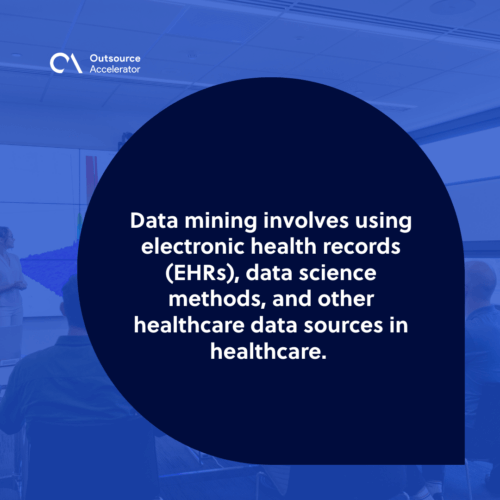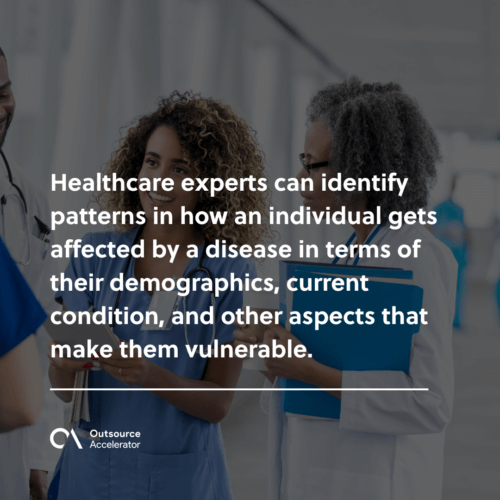8 benefits of healthcare data mining in healthcare operations

As the healthcare industry continues to evolve, the need for efficient healthcare data management becomes increasingly important.
A broader focus on patient care and extensive medical studies has been increasingly needed, especially with the experience from the past years. Healthcare facilities race to keep up with the increasing breakthroughs in the medical industry.
One good example is data mining, which involves using sophisticated software tools to extract and analyze large amounts of data. By gathering insights from extensive healthcare data, organizations revolutionize their operations through evidence-based decision-making.
This article will explore the benefits of healthcare data mining in daily operations.
What is data mining in healthcare?
Data mining is a process used to analyze large datasets to determine patterns, relationships, and trends.
Data mining involves using electronic health records (EHRs), data science methods, and other healthcare data sources in healthcare. It captures different levels of information, from the patient’s personal details to their laboratory tests and treatment plans.
It is used in different medical fields, such as pharmaceutical research, biotechnology, and medical science.

Benefits of healthcare data mining in daily operations
Healthcare data mining helps medical experts gather and interpret patterns, trends, and associations differently. This is because their improved operational efficiency translates to better patient satisfaction and revenue management.
Here are eight benefits of using data mining in healthcare:
1. Enhanced patient care
One of the benefits of healthcare data mining is the ability to improve patient care and safety.
Traditional healthcare data handling has its limitations. Admin teams cannot always handle large volumes of information simultaneously, which could cause delays and inaccuracies in patient diagnoses and care.
Through healthcare data mining, institutions can process and analyze information better, reducing time and effort.
2. Streamlined patient management
Data mining can also help healthcare providers streamline patient management.
Like in other industries, customer management in healthcare operations is crucial in managing interactions and giving the best patient experience possible.
Providers can proactively manage patients from registration to treatment and medical billing with accurate and centralized patient data. At the same time, this lessens the instance of errors in billing, treatment, and other models that could affect their experience.
3. Resource allocation
Healthcare data mining can also help providers allocate resources more effectively.
Data mining algorithms can uncover patterns and anomalies that signify areas of resource mismanagement. They can identify areas where resources should be reduced and where they should be reallocated to reduce waste.
This effort, in turn, improves the institution’s overall efficiency.
4. Early disease detection and prevention
Healthcare providers can quickly identify patterns that may indicate a potential health risk through data mining. This allows them to intervene early and prevent the disease from progressing.
It can also pin down patients at high risk of an existing illness. Healthcare experts can identify patterns in how an individual gets affected by a disease in terms of their demographics, current condition, and other aspects that make them vulnerable.
Through early disease detection, patients will also be aware of the common knowledge of preventing the illness they are vulnerable to.
5. Precise clinical decision-making
Data mining can also help providers make more precise clinical decisions.
Healthcare practitioners can make quicker and more accurate diagnoses and treatments by analyzing patient data. Some institutions already practice this through the use of clinical decision support systems (CDSS).[1]
This can help providers decide and curate better treatment options for each patient, further increasing their outcomes.
6. Improved fraud detection
Insurance fraud usually costs consumers around US$308.6 billion, according to studies, not to mention the damaged integrity on the provider’s part.
Healthcare data mining can identify instances of fraud and abuse in healthcare. Providers can identify patterns and behavior that may indicate fraudulent activity through factors such as billing patterns.
This results in reduced costs and damage to the reputation that fraud may bring them.
7. Real-time patient and performance monitoring
Healthcare data mining is also useful in monitoring patient conditions in real time. By analyzing patient data, providers can identify changes in patient status and intervene early to prevent adverse events.
This can help improve patient outcomes by assisting them to get better and healthier.
8. Data-driven research
Finally, data mining can be used to support data-driven research. Researchers can identify trends that they might miss out on their first observation. This can help support evidence-based medicine and improve overall patient outcomes.
Adopting healthcare data mining in healthcare institutions
In conclusion, healthcare data mining offers numerous benefits to healthcare providers and institutions.
The ones listed above outline how healthcare facilities can use technology to their advantage. However, they must adopt the necessary tools, infrastructure, and personnel to make this happen.
Some small clinics, practices, and local facilities understandably don’t have enough budget and resources to have their data mining efforts in-house. This is where outsourcing data analysts, encoders, and other related roles will be of most help to them.
All it takes is a simple call with the right provider for them.
Article references:
[1] Clinical decision support systems (CDSS). Sutton, R. and Pincock, D. (2020). An overview of clinical decision support systems: benefits, risks, and strategies for success. NPJ Digital Medicine, 3(1), pp.1–10. doi:https://doi.org/10.1038/s41746-020-0221-y.








 Independent
Independent




